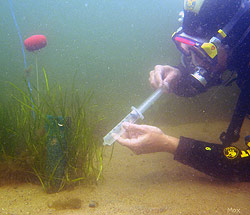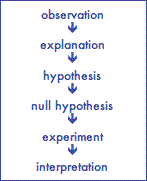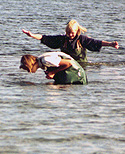Students and teachers, together with scientists, will gain experience in natural science through 4 main activities:
1. Participants will experience a marine research station with international research projects. They will become acquainted with different marine research schemes. One specific research project will be presented more comprehensively by a scientist taking part in the Sea Me workshop.
research projects. They will become acquainted with different marine research schemes. One specific research project will be presented more comprehensively by a scientist taking part in the Sea Me workshop.
2. Participants will practice scientific thinking according to a protocol used by scientists when forming scientific investigations. The scientific protocol is a framework that when followed, will help explain, test and justify observations in nature.
The scientific protocol

Ecological science is about a better understanding of how organisms function and how they interact together with their surroundings. Therefore, scientific investigations are necessary.
Scientific research involves the construction of models that can explain observations we have made and from these models suggest hypotheses that can be reversed into null hypotheses and most importantly can be experimentally tested. A null hypothesis is the opposite of a hypothesis and should express all the outcomes that are not included in the hypothesis.
An investigation that is performed in a correct way should result in only two things: that we either accept the explanation as possible or that we reject it as incorrect.
Independent of support for either hypothesis, it’s important to repeat the whole process several times. Only then might we be able to understand complex associations in nature.
More about scientific reasoning -->
Curiosity and questioning are important qualities to practice, when trying to assimilate a scientific way of thinking.
 Finding explanations to what we hear or experience is something we do constantly. Explanations can be simple or very complex and we can call them theories, which are the results of thoughts, studies and discussions with others.
Finding explanations to what we hear or experience is something we do constantly. Explanations can be simple or very complex and we can call them theories, which are the results of thoughts, studies and discussions with others.
3. Students together with teachers and scientists will form hypotheses and perform experiments of their own. This procedure will promote the students own thinking and when performing experiments, the importance of being meticulous and methodical.
4. Results of studies will be reported and discussed together with scientists. The students will practice giving account of their work, argue their viewpoints and question authorities.

 .
.